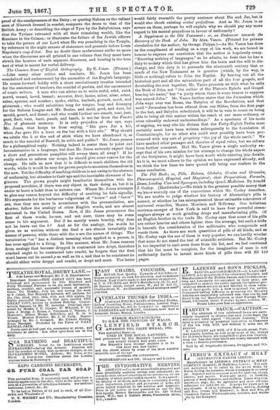The Common Sense of English Orthography. By E. Jones. (Pitman.)
—Like many other critics and teachers, Mr. Jones has been scandalized and embarrassed by the anomalies of the English language. He comes forward boldly with a short revolutionary treatise intended for the assistance of teachers, the scandal of purists, and the amusement of comic writers. A man who can advise us to write stabd, sobd, rubd, oervd, cramd, hewd, beamd; accouter, fiber, luster, miter, niter, ocher, saber, specter, and somber ; opake, obliko, burlesk, grotesk, mask, and pieturesk ; who would substitute tong for tongue, leag and demagog for the Reform League and Mr. Beales, and mold, gord, and dant, for mould, gourd, and daunt ; and who would farther use stanch, tent, jant, gent, flant, vent, hant, panel; and. leach, is not far from the Fonetic Nuz of pleasant memory. It is only prejudice of the eye, says Mr. Jones, that keeps us from saying, "Din gave Jac a kic, when Jac gave Die a knoc on the bac with a thic stic." Why should we retain the k at the end of stick when we have abandoned it, so mach to the scandal of Boswell, In critic and public? Mr. Jones pauses for a philosophical reply. Nothing indeed is easier than to point out inconsistencies in a language, bat does Mr. Jones seriously expect that a short and pretentious pamphlet will sweep them all away ? If he really wishes to reform our usage, he should give some reason for the change. He tells us now that it is difficult to teach children the old words, while it would be easy for grown people to accustom themselves to the new. Yet the difficulty of teaching children is not owing to the absence of uniformity, but attaches to their age and the inevitable slowness of be- ginners. The grown people might familiarize themselves with the proposed novelties, if there was any object in their doing so, but it is easier to learn a habit than to unlearn one. Where Mr. Jones attempts to give- any reason beyond the difficulty of teaching he fails signally. His arguments for the barbarous vulgarisms of " honor " and "favor" are, that they are more in accordance with the pronunciation, are shorter, follow the analogy of other English words, and. are almost universal in the United States. Now, if Mr. Jones pronounces the first of these words, ho-nor, and not calor, there may be some sense in his argument. But if he merely wants brevity, why does not he leave, out the ht And as for the analogy, the words he gives us as written without the final u are almost invariably the names of persons, while those with the u are the names of things. The termination " or " has a .distinct meaning when applied to a person, it has none applied to a thing. In like manner, when Mr. Jones reasons from analogy that because dropped is contracted into dropt, therefore cracked ought to be contracted into crack% he forgets that the first word leaves out its second p as well as its e, and that to be consistent he should either write droppt and crack% or dropt and erect. The latter would fairly resemble the pretty sentence about Die and Jac, but it would also shook existing ocular prejudices. And as Mr. Jones is so severe on them, perhaps he will explain why we should pay any more regard to his mental prejudices in favour of uniformity?






























 Previous page
Previous page